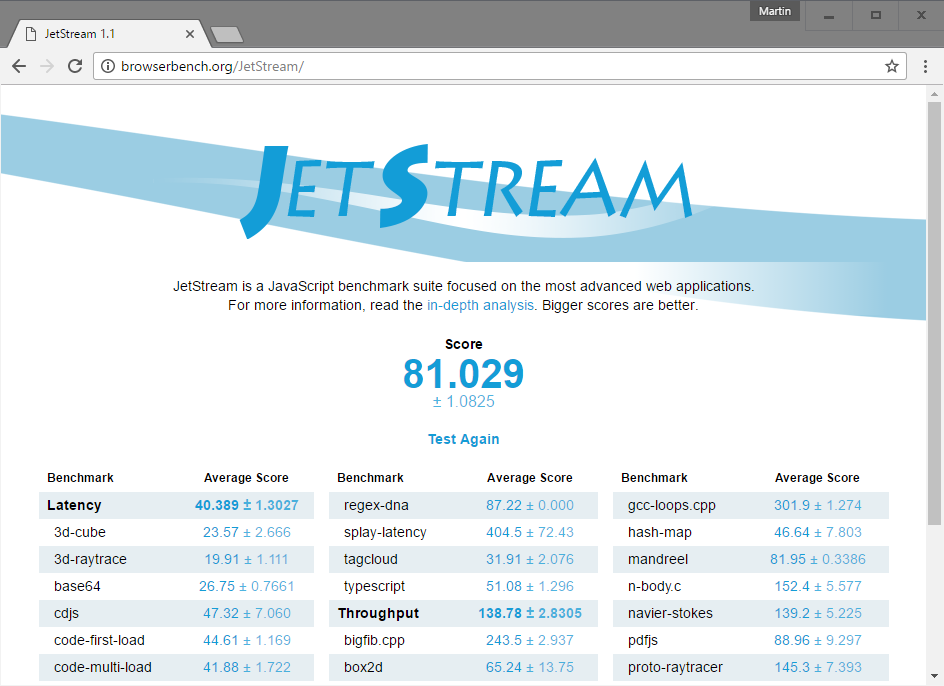Which browser is the fastest?
Which browser is the fastest? When Google introduced Chrome, one area the company put a lot of emphasize on was performance.
Google ran benchmarks regularly showing that the browser's performance was way better than that of other browsers such as Firefox or Internet Explorer which were dominating the landscape at that time.
Today, Chrome is the leading browser used by many. Microsoft tries to regain some control of the market with Microsoft Edge, Opera reinvented itself after its move to using the same engine as Chrome, and Mozilla is working on major changes in Firefox as well.
And Google? It seems that the company has lost some of its edge in the browser world. That does not mean that Chrome is not working well for the majority of users who run it, but that Google for the most part seems to have taken a more conservative stance in regards to development priorities.
Which browser is the fastest?

Being fast is not the only thing that counts, obviously. There is web standards support, support for features that assist users in day to day tasks, privacy or security related features, perceived performance, and extensions support which all play a role when it comes to picking a browser.
We will be looking exclusively at browser performance though, as everything else comes down to what each individual user requires of a browser.
The browsers
We ran benchmarks on two different Windows 10 operating systems, one running the latest stable version of it, the other the latest Insider Build.
Machine 1 (Win 10 Stable)
- Google Chrome Dev (version 53.0.2767)
- Microsoft Edge Stable (version 25.10586)
- Mozilla Firefox Nightly (version 50.0a1)
- Opera Developer (version 40.0.2267.0)
- Vivaldi (1.3.501.6)
Machine 2 (Win 10 Insider)
- Google Chrome Stable (version 51.0.2704.103)
- Mozilla Firefox (version 47.0)
- Microsoft Edge (version 38.14371)
- Opera (version 38)
- Vivaldi (version 1.2)
The benchmarks
We used the following benchmarks to check the performance of all test browsers.
Each benchmark was run twice and without background activity.
The results
| Machine 1 | JetStream | Octane 2.0 | Speedometer |
| Google Chrome Dev (version 53.0.2767) | 80.98 | 14103 | 63.38 |
| Microsoft Edge Stable (version 25.10586) | 147.41 | 21609 | 22.6 |
| Mozilla Firefox Nightly (version 50.0a1) | 96.07 | 13942 | 29 |
| Opera Developer (version 40.0.2267.0) | 110.09 | 17112 | 33.94 |
| Vivaldi (1.3.501.6) | 110.25 | 18697 | 55.7 |
| Machine 2 | JetStream | Octane 2.0 | Speedometer |
| Google Chrome Stable (version 51.0.2704) | 155.55 | 28205 | 88.16 |
| Microsoft Edge (version 38.14371) | 208.91 | 30084 | 32.49 |
| Mozilla Firefox Stable (version 47) | 155.72 | 25691 | 41.1 |
| Opera Stable | 155.02 | 27497 | 57.96 |
| Vivaldi (version 1.2.490.43) | 158.16 | 26455 | 82.79 |
So which browser is the fastest?
The results are somewhat surprising. Chrome's performance on machine 1 is not good in two of the three benchmarks, especially when compared to Vivaldi or Opera which use the same engine. This could be caused by an issue in that particular build of Chrome.
Microsoft Edge did best in JetStream and Octane, but not so good on the Speedometer benchmark. It is rather surprising that there are huge differences between browsers that use the same engine.
Chrome did worse on JetStream and Octane than Opera and Vivaldi, but beat the two in the Speedometer benchmark.
Vivaldi on the other hand did a lot better in the Speedometer benchmark than Opera.
The picture is similar on machine 2. Microsoft Edge was fastest in the first two benchmarks, but came last in the Speedometer benchmark.
Chrome Stable performed about the same as Opera and Vivaldi in the first two benchmarks this time, and Opera's Speedometer performance once again was not close to Vivaldi's or Chrome's.
The takeaway
Google Chrome is not the uncrowned king of browser performance anymore. On machine 2 for instance, it is performing at least as good as all the other browsers in the test, and in the Speedometer benchmark better than them all.
The result on machine 1 paints a different picture but needs verification once newer Dev versions of Google Chrome are released. It is more likely that a bug crept in that caused the lower scores than a major change.
There is no dominating browser anymore, as Edge and Chrome are doing best in different benchmarks.
All in all, it is clear that JavaScript performance, and that is what these benchmarks test after all, is not all that different anymore.
Perceived performance, how fast a browser reacts to user input and page loading times, is more important.
This article was first seen on ComTek's "TekBits" Technology News

- Log in to post comments